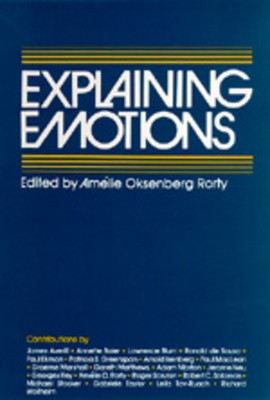
- We will send in 10–14 business days.
- Publisher: University of California Press
- ISBN-10: 0520039211
- ISBN-13: 9780520039216
- Format: 13.9 x 20.9 x 3.3 cm, softcover
- Language: English
- SAVE -10% with code: EXTRA
Explaining Emotions (e-book) (used book) | bookbook.eu
Reviews
Description
The challenge of explaining the emotions has engaged the attention of the best minds in philosophy and science throughout history. Part of the fascination has been that the emotions resist classification. As adequate account therefore requires receptivity to knowledge from a variety of sources. The philosopher must inform himself of the relevant empirical investigation to arrive at a definition, and the scientist cannot afford to be naive about the assumptions built into his conceptual apparatus.
The contributors to this volume have approached the problem of characterizing and classifying emotions from the perspectives of neurophysiology, psychology, and social psychology as well as that of philosophical psychology. They discuss the difficulties that arise in classifying the emotions, assessing their appropriateness and rationality, and determining their function in motivating moral action.
EXTRA 10 % discount with code: EXTRA
The promotion ends in 13d.17:32:36
The discount code is valid when purchasing from 10 €. Discounts do not stack.
- Publisher: University of California Press
- ISBN-10: 0520039211
- ISBN-13: 9780520039216
- Format: 13.9 x 20.9 x 3.3 cm, softcover
- Language: English English
The challenge of explaining the emotions has engaged the attention of the best minds in philosophy and science throughout history. Part of the fascination has been that the emotions resist classification. As adequate account therefore requires receptivity to knowledge from a variety of sources. The philosopher must inform himself of the relevant empirical investigation to arrive at a definition, and the scientist cannot afford to be naive about the assumptions built into his conceptual apparatus.
The contributors to this volume have approached the problem of characterizing and classifying emotions from the perspectives of neurophysiology, psychology, and social psychology as well as that of philosophical psychology. They discuss the difficulties that arise in classifying the emotions, assessing their appropriateness and rationality, and determining their function in motivating moral action.


Reviews